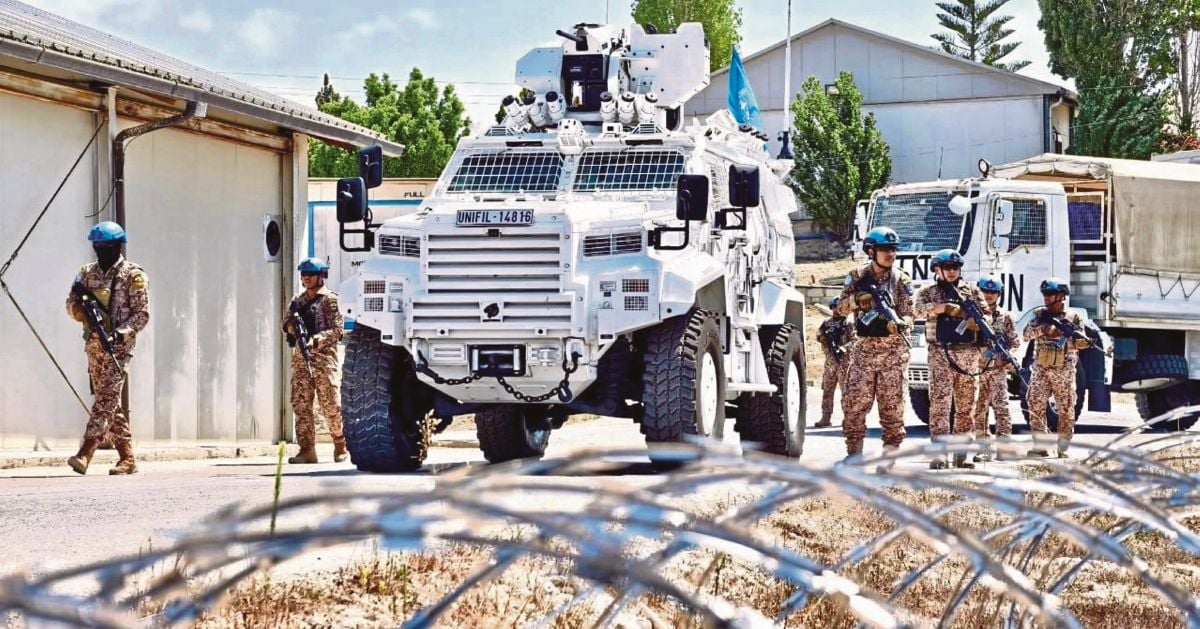KUALA LUMPUR: Malaysian peacekeepers in Lebanon have earned praise for their professionalism under fire when Israel attacked the country last year.
Armed Forces Joint Forces Commander Lieutenant-General Datuk Zahani Zainal Abidin said he was never more proud of his men as he reflected on the Malaysian Battalion’s (Malbatt) service in southern Lebanon under the United Nations Interim Force in Lebanon (Unifil).
“During the ‘Northern Arrow’ (by the Israeli Defence Forces) escalation in September 2024, our troops swiftly activated bunker drills and coordinated with Unifil to maintain zero casualties despite cross-border exchanges.
“Two months later, in November, an Israeli airstrike caused collateral damage to a Unifil convoy, injuring several Malaysian peacekeepers.
“Our rapid medical evacuation and continued mission focus drew praise from the UN and troop-contributing nations,” Zahani said, noting that these incidents reinforced the importance of discipline and rapid response protocols.
HOLDING THE LINE
He said Malbatt operated under the mandate of UN Security Council Resolution 1701, which called for monitoring the cessation of hostilities, supporting Lebanese armed forces deployments and ensuring its area of responsibility was free from hostile activity.
Zahani said Malbatt had adopted stringent force-protection measures to safeguard personnel in a demanding threat environment.
“Troops remain in fortified encampments and bunker drills are activated whenever cross-border hostilities spike. All patrols and logistical movements are suspended under Unifil directives to minimise exposure.
“Regular checks on defensive structures and rapid-access shelters ensure immediate lockdown capability against indirect fire or drone incursions,” Zahani said.
He said under Unifil’s mandate, Malbatt operated with strictly defensive rules of engagement.
“Troops may return fire only if directly attacked. Offensive operations remain prohibited. We embed this principle through live-simulation, ensuring split-second decision-making under stress.
“This clarity is vital in a theatre marked by multiple actors and asymmetrical threats.”
EYE ON THREATS, HEART WITH COMMUNITIES
Zahani said intelligence and coordination were central to Malbatt’s readiness.
“The battalion’s intelligence cell collated inputs from Unifil’s Joint Operations Centre, the Lebanese armed forces and civilian informants.
“Frequent ‘snap’ briefs are also held to update commanders on signs of Hizbollah escalation, Iranian drone flights, or suspected proxy-force staging areas.”
He said daily video-teleconferences with Unifil Sector West and adjacent battalions ensured rapid dissemination of new directives, including no-movement orders and escalation thresholds.
While force protection was critical, Zahani added that civil-military engagement remained the cornerstone of Unifil’s mandate.
“Our engineers partner with municipal councils to repair schools and water systems in Marakah, Tibnin and surrounding villages.
“Periodic town halls are also held to explain Unifil’s peacekeeping objectives to residents, reducing the risk of agitators exploiting grievances,” he said.
Zahani added that this trust-building helped maintain early warning networks and blunt militia influence.
MODERNISATION AND STRATEGIC READINESS
In response to escalating risks along the Israel-Lebanon border, Zahani said the armed forces had modernised Malbatt’s capabilities.
“We replaced our ageing Condor armoured vehicles with 20 Turkish-made Panthera 4×4 platforms in 2023. These offer higher mobility, remote weapon station capability and improved troop protection.
“Further upgrades are already in motion. By mid-2026, Malbatt will add 60 High-Mobility Light Tactical Vehicles (HMLTVs) to its fleet, enhancing agility and enabling rapid repositioning along the volatile Blue Line,” Zahani said, referring to the 120km section of the southern Lebanese border that Unifil oversees.
“These acquisitions are part of a broader plan to strengthen survivability and operational flexibility in one of the UN’s most complex theatres.”
He said Malbatt had also introduced specialised capabilities, such as explosive ordnance disposal (EOD) teams and women’s engagement modules.
“These units not only address evolving operational requirements — from neutralising improvised explosive threats to fostering trust with local communities — but also reinforce the multidimensional nature of peacekeeping under the UN mandate.”
Training and readiness were also prioritised, Zahani said, as all personnel would go through an eight-week Force Integration Training (FIT) programme in Port Dickson before deploying to Lebanon with Malbatt.
“This covers peacekeeping doctrine, cultural awareness, and scenario-based drills aligned with UN standards.”
He added that diplomatic coordination remained central to sustaining mission credibility.
“Malaysia maintains a permanent liaison with the UN Department of Peace Operations (DPO) in New York to ensure real-time alignment of operational priorities with Malaysia’s foreign policy principles — multilateralism, civilian protection and peaceful conflict resolution.
“This strategic outlook was reinforced at the UN Peacekeeping Ministerial Conference in Berlin in May, where Malaysia pledged to deploy an additional infantry battalion, EOD teams and police units for future missions.
“This underscores Malaysia’s long-term investment in robust, multidimensional peace operations and its continued role as a trusted troop-contributing nation,” Zahani said.
© New Straits Times Press (M) Bhd






